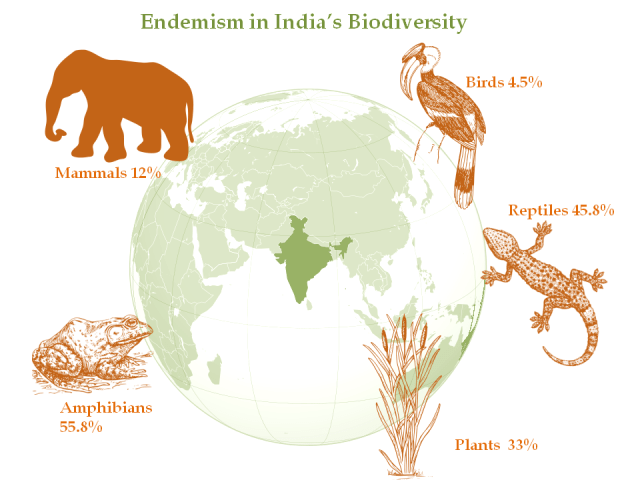Career in Biodiversity
- Home
- /
- Articles



Careers in Biodiversity and Conservation
Is green your favourite colour? Do you love to study about animals and their habitats? Do you have a keen interest in protecting the environment for current and future generations? Do you like working in the great outdoors? Well then, it's high time you found out all about the professional life of a Nature Conservationist or a Biodiversity and Wildlife Expert!
Working in the field - literally!
Nature conservation officers (a.k.a. biodiversity officers) are responsible for ensuring the conservation and sustainable use of natural resources and environments. As a conservationist; main responsibilities involve planning and implementing schemes aimed at protecting, managing and improving natural habitats, monitoring the sustainable use of land and resources, etc. These professionals help find ways to utilize land without harming the environment. Conservationists may also be referred to as soil and water conservationists or conservation scientists. They work in offices, labs and outdoors. Their work may be physically demanding sometimes. The job of a Nature Conservationist is to work to protect and manage and local, natural environment, including grasslands, forests, coastal areas, mountains and rivers. Nature Conservationists also provide farmers with advice, control natural resources like fisheries that are being utilised and they make the general public aware about conservation matters.
There are many career options for those who want to work with wildlife (either native or exotic species). Wildlife management is not an average nine-to-five, office job in the middle of a city. Without exception, work entails to be outdoors, in forests, sanctuaries, etc.
A career in the field of wildlife can be extensive and involve many sub-areas. For example, A Wildlife Biologist studies both animals and plants - It's more common, however, that Wildlife Biologists only work with wild animals; Wildlife Rehabilitators take care of injured or baby animals until they are strong enough to be released into the wild; A Wildlife Manager's responsibility is to ensure that wild animals (including aquatic) maintain healthy population sizes.
A Plethora of Specializations
Less known but very exciting career specializations await nature and animal enthusiasts to become future - Veterinarian, Herpetologist, Ichthyologist, Aquarist, Entomologist, Primatologist, Marine Biologist, Conservation Scientist, Soil Conservationist, Wildlife Conservationist, Natural Resource Manager, Conservation Technician!
How Do You Become a Conservationist/Wildlife Specialist?
In order to have a career in this field, it's important for students to obtain a relevant degree in Science and/or specializing in biology, botany, zoology, environmental science, land management, ecology, geology, rural development, forestry, etc. Veterinary doctors and animal specialists can also specialize in desired fields after graduation. Students can also opt for volunteering with NGO's and various wildlife institutions so as to gain an inside experience of the field which can help them decide for master level and further studies. Various universities and institutes offer post graduate and doctoral programmes in the field. It is ideal that students understand their area of interest, intern or volunteer first before plunging into the outdoors for work. Being extremely passionate and determined to work in this field are pre-requisites.
Few institutes offering related programmes
 National Centre for Biological Sciences (NCBS)
National Centre for Biological Sciences (NCBS)
 Ministry of Science, India
Ministry of Science, India
 Tata Institute of Fundamental Research
Tata Institute of Fundamental Research
 ATREE
ATREE
 Amity Institute of Wildlife Sciences
Amity Institute of Wildlife Sciences

Many institutes offer doctoral and research programmes. A few also certificate and short-term courses and unpaid internship for enthusiasts who wish to explore the areas of work.
Indo-German Biodiversity Programme
The Indo-German Biodiversity Programme is working with its overarching goal of sustainable use of biological diversity to support livelihoods for future generations, recognized as a trusted partner for mainstreaming biodiversity in India. For a comprehensive list of institutes in India visit - www.indo-germanbiodiversity.com
Salary - Generally students need to start as interns but upon experience in the field remunerations go up to Rs. 25000-40000 per month.
Typical Employers:
 Charities/Trusts
Charities/Trusts
 Local authorities
Local authorities
 Utilities
Utilities
 Wildlife trusts
Wildlife trusts
 Government Organizations
Government Organizations
 Conservation Groups
Conservation Groups
Key Skills Required:
 Computer literacy
Computer literacy
 Being organised and self-motivated
Being organised and self-motivated
 Team player
Team player
 Persistence
Persistence
 Commitment
Commitment
 Passion
Passion

